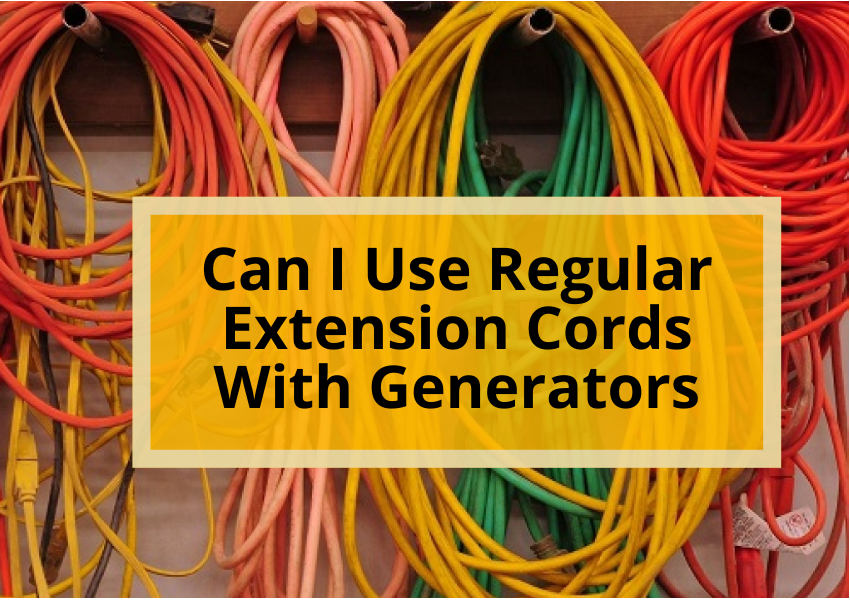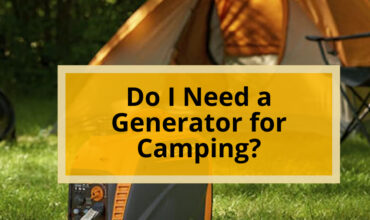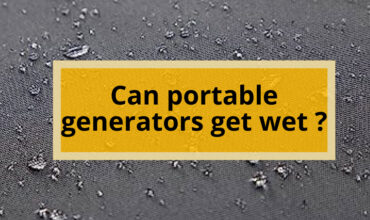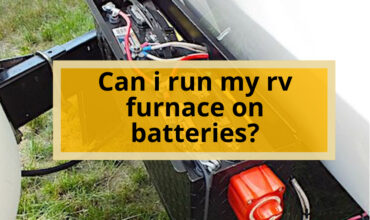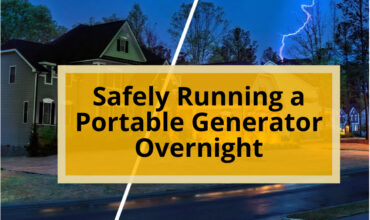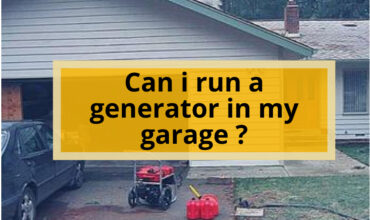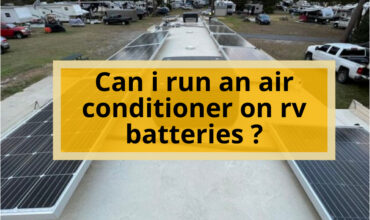Generators are useful tools that provide portable power for a variety of situations. From job sites to camping trips, generators allow you to bring electricity wherever needed. However, you must take proper safety precautions when using generators, especially regarding the extension cords you use to connect devices and appliances.
Many people wonder if regular household extension cords are suitable for generator use. The short answer is maybe, but it depends. There are a few key factors to consider when deciding whether a regular extension cord will work safely with your generator.
Why use a generator extension cord?
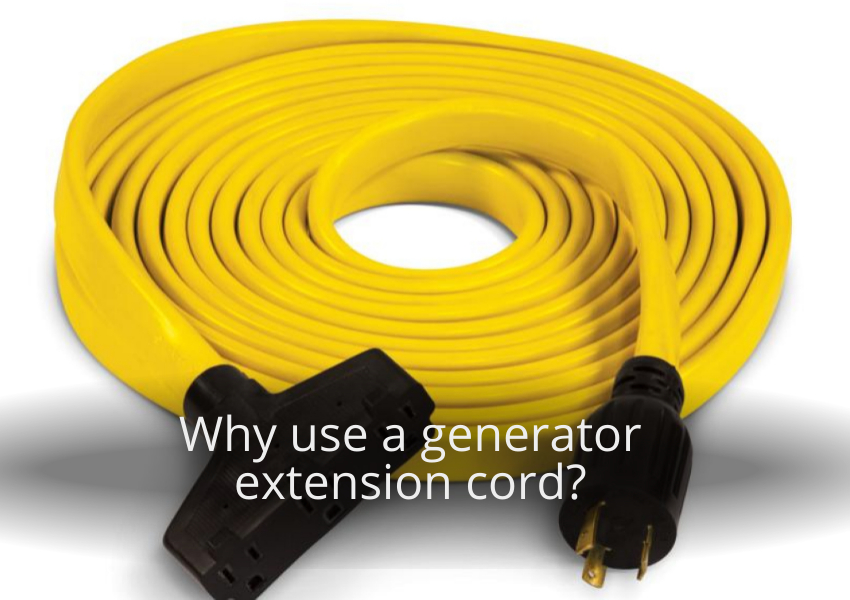
You might want to use a generator extension cord for several reasons.
- First, it allows you to place your generator outdoors, away from home or other buildings. This is important because generators produce carbon monoxide, a poisonous gas that can be fatal if inhaled.
- Second, extension cords allow you to power appliances and electronics farther away from your generator. This can be useful for powering appliances in your home during a power outage or for powering tools and equipment at a construction site or other remote location.
Also read: Can Portable Generators Get Wet?
Factors to consider when deciding whether a regular extension cord will work safely with your generator.
- Wattage Rating
First, you need an extension cord rated to handle your generator’s wattage output. The wattage rating (also called amp rating) on an extension cord indicates the maximum wattage that the cord can safely carry without overheating.
Most standard household extension cords are rated for 1875 watts or 15 amps. It can overheat, melt, or even catch fire if you try to draw more power through the cord than its rating.
Compare the wattage rating on your extension cords to the power output of your generator. If your generator can produce 2000-3000 watts or more, you’ll need heavy-duty extension cords rated for that power level. Using under-rated cords is an unsafe practice that risks your equipment and property.
- Cord Length and Wire Gauge
In addition to wattage rating, an extension cord’s length and wire gauge impact its performance and safety with a generator.
- Longer extension cords lead to more voltage drop, meaning more power is lost through the cord and less reach your devices on the other end. Voltage drop increases resistance in the cord, producing more heat.
It’s best to use shorter, 50 ft or less extension cords for generators to minimize voltage drop. The longer the cord, the thicker the wire gauge must carry power efficiently.
- Wire gauge refers to the size of copper wiring inside the cord. Thicker wire allows electricity to flow freely with less resistance and heat buildup. 12 AWG or 10 AWG thickness are recommended for generator extension cords.
- Outdoor Durability
If running extension cords outdoors for generator power, make sure the cords are designed for outdoor use. Look for cold weather and water-resistant cords with tough, insulated exteriors.
Using indoor-only extension cords outside can lead to weather-related damage over time. The cord’s insulation can degrade, increasing the risk of shock or electrocution.
- GFCI Protection
Use extension cords that provide GFCI (ground fault circuit interrupter) protection for optimal generator safety. GFCI devices shut off power instantly if an electrical fault is detected, which prevents shock and electrocution.
Heavy-duty, outdoor-rated extension cords with built-in GFCI protection provide extra electrical safety when using portable generators. This safeguards both the equipment and anyone operating it.
Also read: Safely Running a Portable Generator Overnight
Proper Connection
- Avoid overloading your generator by plugging too many devices into one extension cord. This can overheat the cord and generator, potentially damaging them.
- Plug extension cords directly into the generator outlet, not into each other in a daisy chain. Only use one cord per outlet to prevent overloading. Don’t exceed the wattage capacity of any single outlet.
- Use three-prong grounded cords for equipment requiring a ground connection for safety. Ensure the generator is properly grounded per the manufacturer’s instructions.
- Inspect all extension cords thoroughly for any damage before using. Look for frayed/exposed wires, cracked insulation, loose plugs, or any moisture inside the cord. Damaged cords should be repaired or replaced immediately.
Safety Tips
Here are some additional tips for safely using extension cords with your generator:
- Keep cords out of areas with high foot traffic to prevent tripping hazards.
- Don’t run cords through doorways or windows where they can be pinched and damaged.
- Avoid running cords near heat sources or across hot surfaces.
- Provide proper ventilation for your generator to prevent overheating.
- Use a ground fault circuit interrupter (GFCI) at the generator outlet.
- Never operate a generator indoors or near open windows for proper ventilation.
- Turn off the generator when refuelling. Allow it to cool before refuelling.
- Store fuel safely away from the living areas of your home.
- Keep a fire extinguisher nearby in case of electrical or fuel-related fires.
Also read: Plugging a Generator into a Wall Socket
In addition to the above, here are some additional tips for using generator extension cords safely and effectively:
- Use a transfer switch: A transfer switch is a device that allows you to connect your generator to your home’s electrical system safely. This can be useful for powering your entire home during a power outage, but a qualified electrician must install a transfer switch.
- Ground the generator: It is important to ground your generator to prevent electrical shock. This can be done by connecting a grounding rod to the generator and driving it into the ground.
- Avoid using multiple extension cords: If you need to power multiple appliances or electronics, it is best to use a power strip instead of daisy-chaining extension cords. This will help to prevent the extension cords from becoming overloaded.
- Store extension cords properly: When you are not using your generator extension cords, store them
FAQ
Do I need special extension cords for RV generator hookups?
Yes, use heavy-duty cords designed specifically for RV generator connections. These are rated for 30 amps and adapt the output for RV use.
How do I choose the right gauge extension cord for my generator?
The gauge of an extension cord refers to the thickness of the wire. The lower the gauge number, the thicker the wire and the more amperage it can handle. For example, a 10-gauge extension cord can handle more amperage than a 16-gauge extension cord.
What are the dangers of using the wrong extension cord with a generator?
Using the wrong extension cord with a generator can be dangerous. It can cause the extension cord to overheat, leading to a fire. It can also cause the extension cord to melt, creating a shock hazard.
How do I store generator extension cords properly?
When you are not using your generator extension cords, store them in a cool, dry place. Avoid storing them in direct sunlight or in areas where they could be exposed to moisture or chemicals.
Conclusion
By following these guidelines, you can safely use regular household extension cords with your portable generator, provided they are properly rated for the power output. Heavy-duty, outdoor-rated cords with GFCI protection are ideal for greater electrical safety and peace of mind. Always inspect cords closely and replace any that are damaged. With the proper cords and safety precautions, you can power essential devices even in a power outage.
